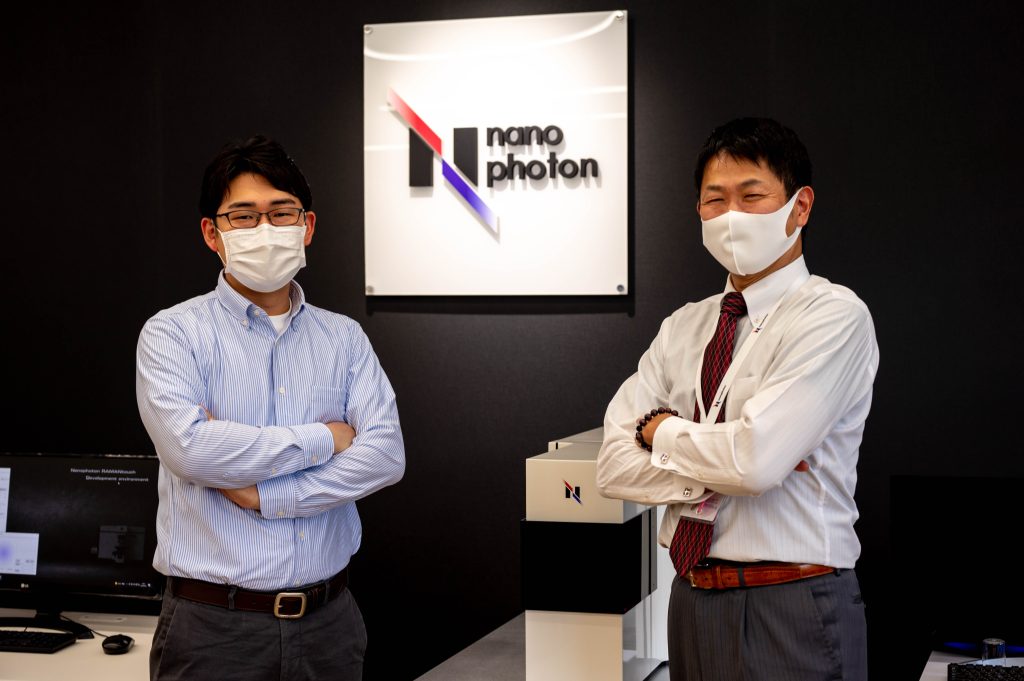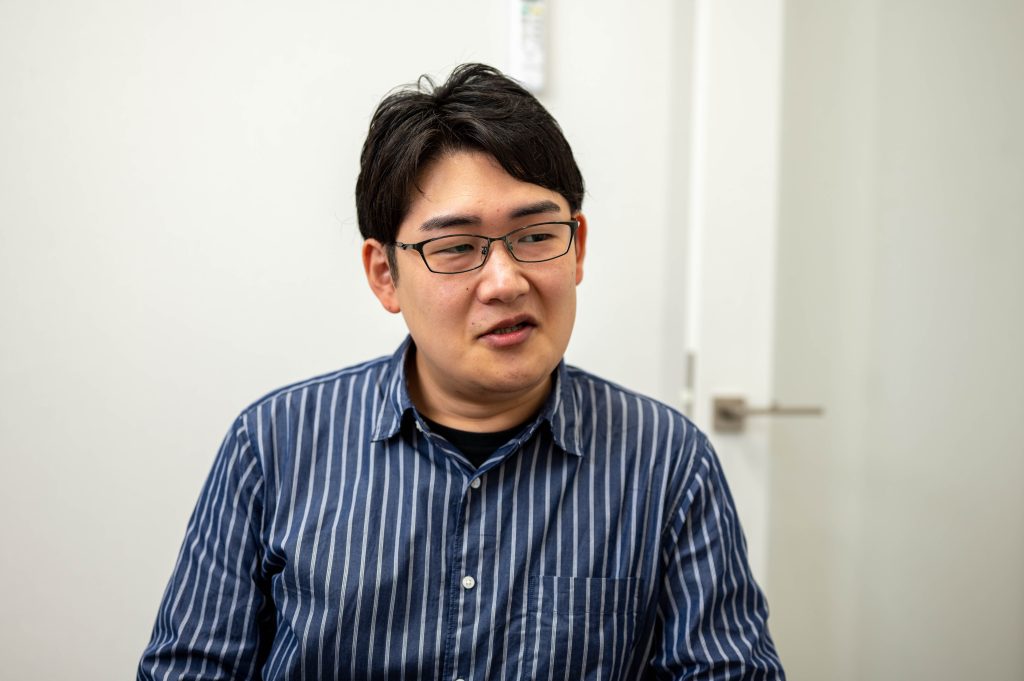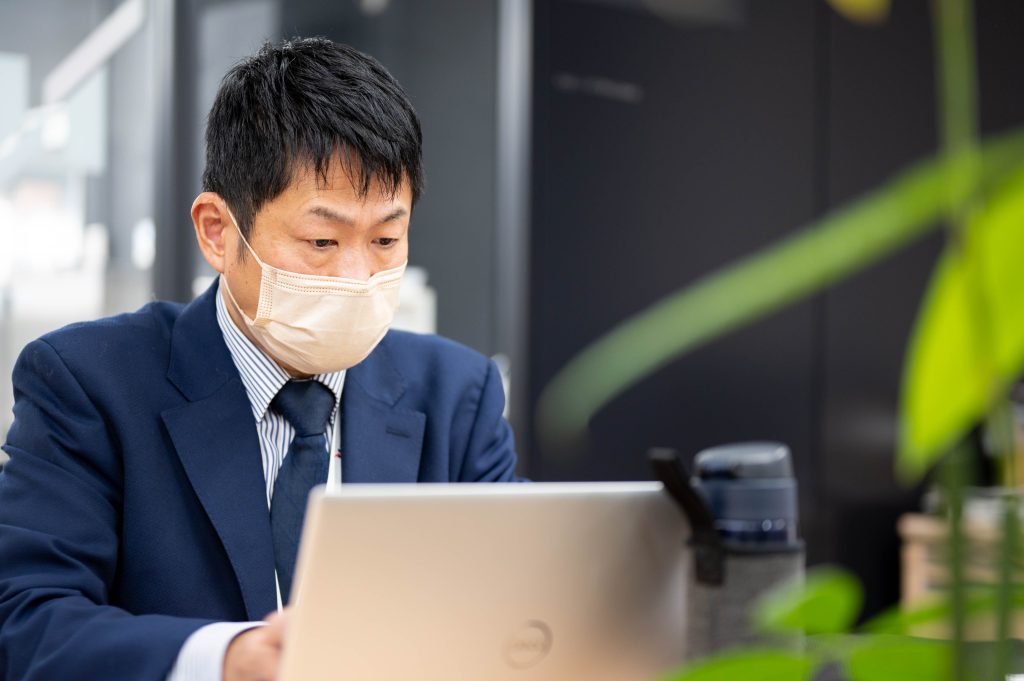Email Magazine
Our Employees (5/27/2022)
Two new members joined Nanophoton in February. Akira Okutani, 37, a service engineer, and Shinji Iguchi, 51, a sales representative. I interviewed them about how they joined the company and their ambitions. Mr. Okutani, who studied magnetic materials at university, is growing up with the experience of adjusting experimental equipment by himself. With the help of these two, Nanophoton will make even greater strides. (Takeshi Nemoto, Email newsletter editor-in-chief/freelance writer)

Akira Okutani, Service Engineer
–What kind of work do you do at Nanophoton?
I am Service Engineer. They deliver the equipment to the customer, make sure it is ready for operation, and confirm that it is performing according to specifications. In addition, they are also responsible for periodic inspections and trouble-shooting.
Studied magnetism at Osaka University
–I heard that you graduated the Graduate School of Science at Osaka University. What kind of research did you do?
This is a study of magnetic materials. When a strong magnetic field is applied to a sample, the state of the material changes, and I investigated how it changes.
–In the Graduate School of Science, it’s not really “manufacturing”.
Yes, we do. However, we assemble and adjust the experimental equipment ourselves and use it. I was using a measurement device called an electron spin resonance (ESR) system. The properties of matter vary considerably depending on the behavior of electrons. This is one of the methods to investigate the state of those electrons.

Basically, I apply electromagnetic waves of various frequencies to change the magnetic field. The sample absorbs the electromagnetic waves in a specific magnetic field, and the state of the material can be determined by following the point of absorption.
–How did you come to Nanophoton?
Before Nanophoton, I was a specially appointed assistant professor at the University of Fukui. When I was looking for a job after my term was up, I found Nanophoton on a job site for researchers.
Looking at Nanophoton’s website, I could tell that the technology is solid and that the company has been in business for almost 20 years and has a solid foundation. Moreover, I felt a sense of familiarity with the company since it is a startup originating from Osaka University.
“Research and development will eventually”
–Did you apply to the position of service engineer yourself?
No, I did not. When I applied for the position, I applied to be in charge of research and development. During the interview, I was told, “What we need most right now is a service engineer. I was told, “We want you to be involved in R&D eventually,” so I decided to start as a service engineer. Even if I were to get involved in development, I would not understand anything if I did not know anything about the current equipment.
–It has been almost 4 months now. How is work going?
At University, I tinkered with equipment and did experiments and maintenance, so I think it was easy for me to fit in with my current service work. On the other hand, I am enjoying learning new things about Raman microscopes and how the company operates, which I had no idea about.
What I feel is the high level of employees. For example, if you ask someone about a piece of equipment, they think deeply and answer me. I think Nanophoton hires people like that. I intend to eventually reach that level.
Then there is the amazingness of the equipment. University experimental equipment has high performance, but it is a one-of-a-kind product tuned by craftsmen. Nanophoton, on the other hand, maintains performance and mass-produces its products by incorporating the tuning procedures into the product. I am impressed.
–Do you feel that you would like to hone your skills as a service engineer while also wanting to do research and development?
Yes, I would. If I am entrusted with research and development in the future, I would like to develop in a direction that makes it easier for service engineers to do their jobs.
I sometimes go for a 20-kilometer walk.
–Please tell us a little about your personal life. What are your hobbies?
I like to walk. When I walk, I don’t have to think about anything. Once every few months or so, I go for a 20-km walk.
I also became obsessed with kitchen knives while working part-time at an izakaya (Japanese-style pub) as a student, so I have a collection of Japanese-style kitchen knives. Sharpening kitchen knives has become my hobby.
–I would like to see with a Raman microscope how the cutting surface of the food changes depending on how the knife is sharpened. Please cooperate at that time. Thank you very much for your time today.
Shinji Iguchi, Sales Representative
–What kind of work did you do before coming to Nanophoton?
I worked in sales for Carl Zeiss, a German optical equipment manufacturer, for 14 years. Before that, I worked for a distributor for about 12 years, and I changed jobs when I was approached by Carl Zeiss. I resigned from Carl Zeiss about two years ago. I had been vaguely thinking of quitting my job at the age of 50.
So I was wandering around, but my wife said, “It’s too early. You need to work” (haha). I was certainly not in a position to FIRE (Financial Independence and Early Retirement), so I rejoined a company in a completely different industry as a sales manager. However, after a while, the sales office was closed due to COVID-19, ……. At that point, I thought, “I need to be a little more physically active,” so I applied to Nanophoton.
Nanophotons and when I worked for Carl Zeiss.
–Why Nanophoton?
I have known about Nanophoton for a long time. In fact, they were a customer of mine when I worked for Carl Zeiss. For a while, I had been purchasing stages from them.
When I was looking for a job, I saw on their website that they were looking for employees. I had never handled a Raman microscope before and it looked difficult, but I decided to give it a try because I thought, “If I can work in an industry similar to Carl Zeiss and be involved in microscopy, I can use my knowledge and experience.
–What was your image of Nanophoton?
I had heard that it was a venture, so I thought, “If it has been going on for so long, it must be doing well.

–You were in the microscope business at Carl Zeiss?
I worked in the Industry Division, selling microscopes and other instruments to private companies and university engineering departments, and I also worked in a department that sold 3D measuring machines and X-ray CTs for measurement purposes. Microscopes are difficult in some ways, but they are interesting.
–You can use your knowledge of microscopy with Nanophoton.
Since I have many years of experience looking at various things with a microscope, I think I can give advice to customers when they wonder why things look this way. The other day, when I was doing a demonstration measurement of a film, I told them, “If you observe not only the surface but also three-dimensionally, you can see the dispersion state of the components.
Return to the field of sales and feel the fun
–Is your work fulfilling right now?
It is fun to be back in the same industry. I’ve also revived exchanges with agencies that I used to have a relationship with. It’s rewarding to be able to move around, get more projects, and build connections.
As I have learned well since joining the company, Nanophoton’s products have a competitive edge. They have great potential. The rest depends on your sales ability. It’s a great opportunity to show your strength.
Also, Nanophoton’s employees are all nice people with common sense, so I feel safe working there.
–What are your aspirations for the future?
The company now has a policy of doubling salaries and doubling the number of employees. To achieve this, we need to increase sales, right? I would like to use my knowledge and experience to help the company grow.
Home flooring is my DIY project.
At the last, may I ask what your hobbies are?
DIY. I built a home with poured concrete, and I put in the flooring and doors by myself. I have now completed about 80% of the work. During the period when I couldn’t go outside because of COVID-19, I stayed at home and worked on it.
–It’s amazing that you even make your own doors. Please keep us informed about your work and hobbies. Thank you very much for your time today.